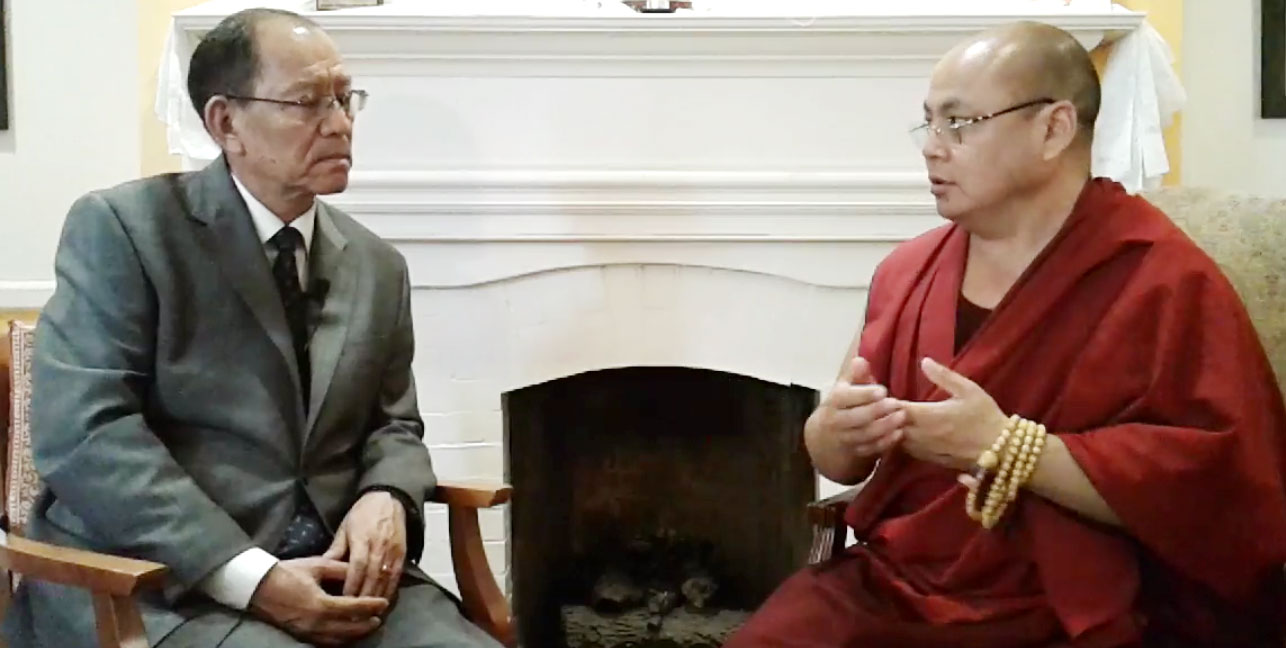
Golok Jigme, who helped create “Leaving Fear Behind,” being interviewed by International Campaign for Tibet Vice President Bhuchung K. Tsering about the ongoing human rights crisis in Tibet 10 years after the documentary premiered.
A decade later, the situation in Tibet has only gotten worse.
The documentary, “Leaving Fear Behind,” features interviews with average Tibetans describing, in heart-wrenching detail, the inhumanity of Chinese rule, as well as their feelings about the then-upcoming 2008 Summer Olympics in Beijing.
I started my new job as Communications Officer with the International Campaign for Tibet (ICT) earlier this summer, and one of the first things my colleague John N., ICT’s Advocacy Officer, told me to do was watch “Leaving Fear Behind.”
It was a wise call: There was something uniquely moving about seeing the faces of the real people of Tibet and hearing them explain their own life experiences, and I felt inspired to work even harder to advance their cause.
If you haven’t seen the film yet, there’s information below about how to watch it. But keep reading, because the story of how “Leaving Fear Behind” came to be is almost as compelling as the documentary itself.
Plight of the Tibetan people
Appearing onscreen toward the end of the 25-minute documentary, the filmmaker, Dhondup Wangchen, says his goal was “not to make a famous or particularly entertaining film. This film is about the plight of the Tibetan people–helpless and frustrated.”
That frustration can be seen throughout the footage, with Tibetans decrying China’s severe restrictions on their freedoms and way of life.
Several of the people interviewed in the film talk about China’s efforts to force Tibetans off their land in order to steal Tibet’s rich natural resources.
The Tibetans also discuss their lack of religious freedom, as well as their desire to see the return of their spiritual leader, the Dalai Lama. The Dalai Lama was forced into exile in 1959 after China invaded Tibet, and he has not returned to his homeland since.
In a particularly poignant scene, an elderly Tibetan wipes away tears as the Dalai Lama is seen on TV receiving the United States Congressional Gold Medal in 2007.
Several of the Tibetans in “Leaving Fear Behind” say China’s hosting of the Olympics had done nothing to improve their situation. Indeed, a few months before the Games began, large-scale protests against China broke out across the Tibetan plateau.
“China was awarded the Games on the condition that the situation in China and Tibet would improve,” one monk says. “…However, after they were awarded the Games, there has been no greater freedom or democracy, and repression is getting stronger and stronger.”
Despite this repression, Wangchen says nearly all of the more than 100 Tibetans interviewed for the film agreed to have their faces shown: “Some said that we absolutely had to show their faces, otherwise it wasn’t worth speaking to them.”
Journey to leave fear behind
To create the documentary, Wangchen and Golok Jigme, a Tibetan monk and activist, spent about six months making a perilous journey through the eastern regions of Tibet.
After they finished shooting, both men were arrested, but they successfully managed to smuggle their footage out of the country.
On August 6, 2008, “Leaving Fear Behind” premiered in secret before a group of foreign journalists in Beijing, just days before the Olympics began.
Although the documentary reached the outside world, both Wangchen and Jigme were arrested for their attempts to exercise free speech. Wangchen was given a six-year sentence, and, after being subjected to close surveillance and mistreatment by Chinese police after his release, he decided to flee the country.
On Christmas Day 2017, Wangchen arrived in San Francisco and was finally reunited with his family in San Francisco. Earlier this year, he described his ordeals—including the depraved conditions in China’s jails—during his testimony to the US Congressional-Executive Commission on China.
Jigme was also arrested and severely tortured. He managed to escape and go into hiding, where he lived in constant fear until he was able to flee to India in 2014.
A few weeks ago, Jigme was in Washington, DC for the US State Department’s first Ministerial to Advance Religious Freedom. US Vice President Mike Pence praised Jigme in a speech during the event, saying “we are honored by your presence, and we admire your courage and your stand for liberty.”
Worsening situation
“Leaving Fear Behind” has been screened in several countries since its release, including at a 2014 showing in the European Parliament that ICT helped to organize.
In the US, the film can be watched on YouTube with English subtitles.
Although the film and the filmmakers made it out of Tibet, Jigme said in a recent interview with ICT that, “Basically, under the Chinese Communist authoritarian rule, under [Chinese President] Xi Jinping, the situation has become much worse” in Tibet since 2008.
“Leaving Fear Behind” was an act of extraordinary courage by ordinary Tibetans who simply wanted the world to know about the enormous repression they faced. As we mark the 10th anniversary of this brave film, all of us who care about human dignity must redouble our efforts to advance human rights and self-determination for the people of Tibet.

[…] 10 years after “Leaving Fear Behind” exposed Chinese repression, situation in Tibet has only got… […]